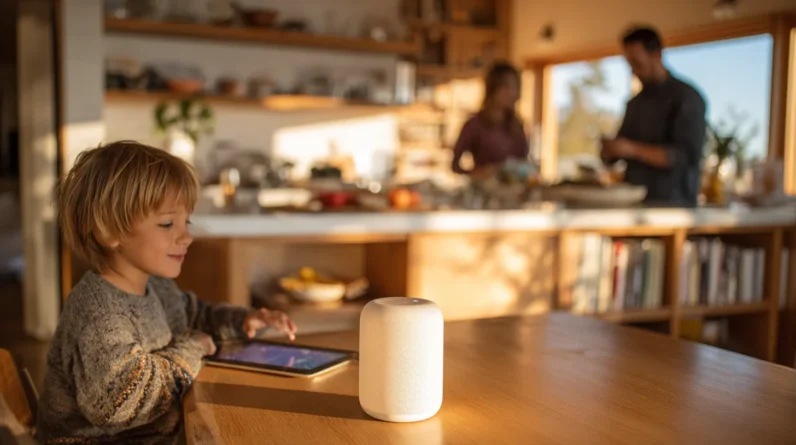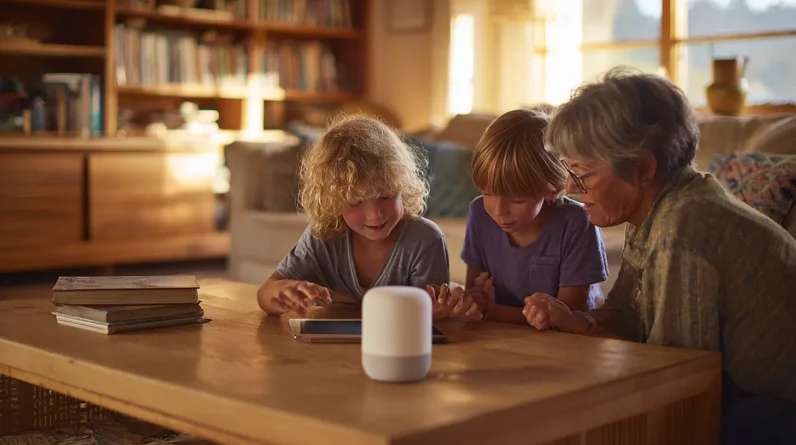
We’re asking the right questions about the impact of voice assistants on child development. While these tools can create interactive learning experiences and provide access to educational content, we can’t ignore their limitations. They lack emotional intelligence, can’t offer physical comfort, and may provide inaccurate information. It is crucial to weigh the benefits against the drawbacks, considering how voice assistants affect social skills, emotional intelligence, and cognitive growth. Let’s explore this complex issue further to better understand their role in our children’s lives.
The Benefits of Voice Assistants on Child Development
As we consider the impact of voice assistants on child development, it’s vital to acknowledge the benefits they can bring. We can leverage voice assistants to create interactive learning experiences that foster cognitive growth and language skills in children. By using voice commands, kids can access a vast array of educational content, from nursery rhymes to science facts, which can stimulate their curiosity and creativity. Additionally, voice assistants can help children develop essential skills like problem-solving, critical thinking, and communication. They can also provide personalized feedback and encouragement, boosting a child’s confidence and motivation to learn. By harnessing the potential of voice assistants, we can create a more engaging and effective learning environment that supports the cognitive, social, and emotional development of children.
Understanding the Limitations of Voice Assistants in Childcare
While voice assistants can be a valuable tool in childcare, it’s essential that we recognize their limitations to guarantee we’re not over-relying on technology to raise our kids. We must acknowledge that voice assistants lack emotional intelligence and empathy, important components of human interaction. They can’t provide physical comfort or understand a child’s emotional cues. Additionally, voice assistants may not always provide accurate or age-appropriate information, and their responses can be misinterpreted by children. It’s also important to take into account the potential for voice assistants to be used as a substitute for human interaction, potentially hindering a child’s ability to develop critical thinking skills. By understanding these limitations, we can use voice assistants effectively and responsibly in childcare.
How Voice Assistants Affect Children’s Social Skills
Because voice assistants are increasingly integrated into daily life, we need to examine their impact on children’s social skills, a significant aspect of development that lays the foundation for lifelong relationships and communication. We’re finding that voice assistants can hinder children’s ability to develop essential social skills, such as empathy, conflict resolution, and negotiation. Interacting with voice assistants, which lack nonverbal cues and emotional intelligence, can limit children’s opportunities to practice and refine these skills. Additionally, the instant gratification provided by voice assistants can lead to unrealistic expectations and impatience in social interactions. As we consider the role of voice assistants in childcare, it’s important to weigh these potential drawbacks and explore strategies to mitigate them, ensuring that children develop the social skills necessary for future success.
The Role of Voice Assistants in Fostering Emotional Intelligence
We must also consider how voice assistants can impact emotional intelligence, which is intertwined with the social skills we’ve just discussed. As we explore the role of voice assistants in fostering emotional intelligence, it’s vital to recognize that these devices can influence children’s emotional awareness and regulation. Voice assistants can help children identify and express their emotions through various interactions, such as sharing stories or playing calming games. However, it’s important to acknowledge that voice assistants lack emotional depth and empathy, which are critical components of emotional intelligence. Consequently, we must guarantee that voice assistants are used in conjunction with human interaction and guidance to promote healthy emotional development in children. By doing so, we can harness the benefits of voice assistants while mitigating their limitations.
Examining the Cognitive Impact of Voice Assistants on Children
As we explore the effects of voice assistants on children’s cognitive development, an essential aspect to reflect on is how these devices can shape young minds. We’re often concerned about how voice assistants might impact our children’s learning and problem-solving skills. Research suggests that these devices can have a significant impact on cognitive development.
Some key areas where voice assistants can make a difference in children’s cognitive growth include:
- Development of Critical Thinking Skills: Voice assistants can encourage children to ask questions and seek answers.
- Access to Educational Resources: Voice assistants can provide a wealth of educational content and activities.
- Enhancement of Language Skills: Voice assistants can engage children in conversations, improving their communication skills.
- Promoting Curiosity and Exploration: Voice assistants can spark children’s curiosity, encouraging them to learn more.
Navigating Parental Responsibilities in the Age of Voice Assistants
Since voice assistants have become an integral part of many families’ daily lives, maneuvering parental responsibilities in this new technological landscape can be intimidating. We must consider how our roles as guardians and educators intersect with these devices. As we navigate this uncharted territory, it is crucial to recognize both the benefits and drawbacks of voice assistants in child development. We need to assess how these devices influence our children’s daily routines, social interactions, and learning experiences. By understanding the dynamics at play, we can harness the potential of voice assistants to support our parenting goals, rather than undermining them. This requires ongoing evaluation and adaptation, as the technology and our children’s needs continue to evolve.
Setting Boundaries for Healthy Voice Assistant Use in Children
Establishing clear boundaries for voice assistant use is an essential aspect of promoting healthy child development in the digital age. We need to set limits to guarantee children don’t over-rely on these devices. Here’s what we should consider:
- Limit screen-free time: Designate device-free zones in the home and establish screen-free times of the day.
- Set voice assistant goals: Encourage children to use voice assistants for specific, educational purposes, like learning new languages.
- Monitor usage: Regularly review voice assistant activity to prevent excessive use.
- Teach digital etiquette: Educate children on polite interactions with voice assistants to promote social skills.
Conclusion
We can’t deny that voice assistants have become an integral part of our children’s lives. As we navigate the benefits and limitations of these devices, it is crucial to acknowledge the “teaching moment” they present. By setting boundaries and encouraging responsible use, we can harness their potential to foster emotional intelligence, social skills, and cognitive growth. Let’s view voice assistants as tools, not substitutes, for human interaction and parental guidance, striking a balance that promotes healthy development.







